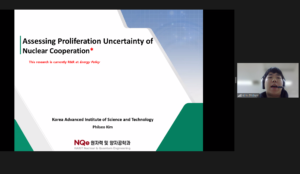From January 12-14, the Center for Nuclear Security Science and Policy Initiatives (NSSPI) conducted a three-day workshop on nuclear safeguards fundamentals in coordination with the Japanese Chapter of the Institute for Nuclear Materials Management (INMM). The workshop was an INMM-sanctioned event directed at students and early career professionals working in nuclear safeguards. 75 participants from 14 different countries registered for the virtual event.

The first part of the workshop consisted of a series of self-paced online course modules focused on defining the objectives and components of nuclear safeguards, outlining the facilities of the nuclear fuel cycle that could be placed under safeguards, and explaining how the IAEA uses nuclear material accountancy and control to impose safeguards on those facilities. The online modules were developed by NSSPI and the Japanese Atomic Energy Agency’s Integrated Support Center for Nuclear Nonproliferation and Nuclear Security (ISCN). Participants who completed the online course modules earned a professional certificate.

Two days of the live virtual session of the workshop were devoted to presentations by safeguards experts from the US, Japan, and South Korea. On the first day, Jill Cooley of the Y-12 National Security Complex gave a presentation on “International Safeguards,” Idaho National Laboratory’s Mark Schanfein spoke about “IAEA Facility-Level Safeguards and Implementation,” and Tomonori Iwamoto of Japan Nuclear Fuel Limited covered “Safeguards Monitoring of Fuel Reprocessing and MOX Fuel Fabrication.” The second day of talks featured Man-Sung Yim of the Korea Advanced Institute of Science and Technology (KAIST), who spoke about “Policy and technical aspects of international safeguards in regards to small modular reactor development,” James Garner of Oak Ridge National Laboratory, who covered “Safeguards Monitoring of Uranium Enrichment Plants,” and Masato Hori of ISCN, who gave a presentation on “Safeguards Challenges for Spent Fuel and Waste Management.” The session concluded with a virtual tour of the URENCO USA Uranium Enrichment Facility by Chris Schwarz, who is the Security, Safeguards, and ECP Manager for URENCO USA. Students from Texas A&M University, the Tokyo Institute of Technology, and KAIST gave presentations of their ongoing research on the final day of the live virtual session. Participants and the expert panel were able to question them on their projects.
According to NSSPI Director Dr. Sunil Chirayath, “This workshop was a real success. This is a clear example how ISCN, INMM-Japan, and Texas A&M-NSSPI can join hands to conduct excellent workshops in the area of nuclear security and nonproliferation.”